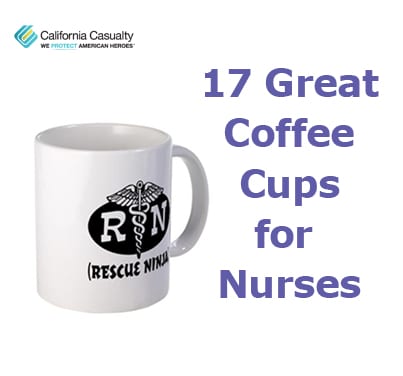
by California Casualty | Nurses |
Nurses work long hours around the clock to save lives and provide patients with the best level of care; however they do so much more than just physical care. Nurses provide emotional support and educate patients and families on conditions, they create high-level treatment plans and assist doctors and patients with everything from surgery to simple everyday activities, and they even find time to provide support and soothe the anxious. Nurses do all of this and more while working with multiple patients at the same time!
Being a nurse is a highly emotional job that really takes its toll, yet nurses go into work every day expecting the unexpected with a smile on their faces. Nurses are at the heart of the healthcare system, yet they often don’t get the recognition they deserve. So, we have rounded up a list of companies that offer discounts to nurses as a, “thank you” to these strong men and women.
Each store is linked for you convenience, just click on the stores name, and it will direct you to their discount page!
Scrubs & Accessories
Happy Feet: offers discounts on shoes for hospital workers and free shipping
Uniform Advantage: offers discounts on shoes for hospital workers
BH Uniforms: offers wholesale prices on all medical attire
Comfort Scrubs: offers wholesale prices on scrubs
Sheehan Sales Inc: offers wholesale prices on nursing uniforms and scrubs
Discount Medical Uniforms: offers discounts on scrubs, shoes, and medical accessories
Lydia’s Uniforms: offers discounts on scrubs, shoes, and medical accessories
Medical Scrubs Mall: offers 45% off scrubs
Pulse Uniforms: offers discounts on scrubs that you can personalize
Scrubs & Beyond: off discounts on scrubs and accessories
Scrubs Gallery: offers discounts on scrubs
Medical Supplies
allheart, America’s Medical Superstore: offers nurse kits with carrying cases for a discounted price
EpiPens4School: offers registered school nurses at k-12 public schools 4 free epi-pen injectors, epi-pen trainers, and a storage locker
Dollar Days: offers discounted wholesale nursing supplies
Medical Wholesale: offers discounted wholesale nursing supplies
Quill: offers wholesale prices on medical supplies
Medex Supply: Nurses are available for discounts when they apply online and provide valid credentials
Healthcare Products & Samples
Bayer Consumer Health Products: free samples to medical professionals on brands like Aleeve, Bayer Aspirin, Claritin, Coppertone, Flintstone Vitamins, MiraLAX, One a Day Womens: Prenatal, Phillips’. Restrictions apply.
Aveeno: offers free patient samples and support material for medical staff
Eucerin: offers free product samples, patient education material, and coupons for medical staff
Clorox: offers free product samples, kits, and training material for medical staff. Restrictions apply.
Ilovefreebies.com: offers free healthcare product samples for medical staff
P&G Personal Healthcare: offers free samples for medical staff
Tylenol: offers free product samples to medical staff with physician signature
Zyrtec: offers free allergy medication samples, resources and coupons for medical staff
Miscellaneous
New York & Co.- offers you and your spouse 15% off your in-store purchase for nurses
TOMS: offers a 10% discount to nurses when verified through SheerID
Sleep Number: offers 25% off select mattresses for nurses
Kirklands: Registered Nurses get a 10% discount on home décor on all service holidays
Sprint: offers discounts on monthly service to Registered Nurses through the Sprint Discount Program
Verizon: offers 15% off your monthly plan for nurses
Texas de Brazil: offers 20% off discount to nurses
Positive Promotions: offers discounted prices for bulk orders of the Nursing Survival Kit, which includes notes and candies
Walt Disney World Swan and Dolphin Resort: offers special room rates for Registered Nurses with proof of employment
GovX: offers discounts to nurses for sporting and concert tickets, hotels, resorts, movie theatres, events, tours, and more when you sign up through their site
*Hundreds of more discounts for nurses (on food, clothes & accessories, travel, lifestyle, and technology) are available through ID.me when you sign up and verify your nurse status.
For more information visit:
https://bit.ly/2K5flxD
https://bit.ly/2Yz5M22
https://bit.ly/313A5eB
https://bit.ly/2YwSpiB
This article is furnished by California Casualty, providing auto and home insurance to educators, law enforcement officers, firefighters and nurses. Get a quote at 1.866.704.8614 or www.calcas.com.
by California Casualty | Nurses |
 Have you lost the happy feeling that your job used to bring? Are you already annoyed by the thought of your job? Let’s find that joy and smile that you once had from being a nurse.
Have you lost the happy feeling that your job used to bring? Are you already annoyed by the thought of your job? Let’s find that joy and smile that you once had from being a nurse.
These 5 tips can make you feel more passionate about nursing:
1. Find a Support System. If you hate your job, most likely you will withdraw from the people that you work with. Research shows that your co-workers are the number one reason for loving your job. Find people that have similar interests and values as you. Don’t be afraid to make the first move of initiating a conversation. Smile. Offer help. Be a part of a community.
2. Let It Go. Being a nurse involves a ton of emotions. You, like a sponge, absorb some patient’s pain and that can take a toll. Learn that a patient’s struggle isn’t personal towards you and let that stress go. Focus on the best parts of the day, the good you’ve done for your patients.
3. Avoid Games. Don’t get sucked into office politics. It can be an easy trap to fall into but avoid at all costs. Take the different road and find a different joy in games on your phone or new hobbies.
4. Follow the Sunshine. Work can feel like a beat down after a while. So through the darkness, search for the sunshine. Find the joy in the office. Ask to help with a project or co-worker.
Finding joy in your job is a choice and takes practice. There will be hard days but look for the positive in each one. Remember the hobbies and happiness that is outside of work too.
5. Create a Bucket List – Nurse-Style. Focusing on the nursing goals you want to accomplish can serve as a source of inspiration. While you’re at it, why not make a list of the things you’ve already accomplished in your career – starting with making it through nursing school. Keep your lists with you and refer back to them when you feel the nursing blahs come on. You’ve done a lot and grown as a nurse, so give yourself a pat on the back. You deserve it.
What helps you get through the hard days? Share with us in the comments.
by California Casualty | Nurses |
Nurses face a highly demanding career with long hours and stressful situations. About 40% of nurses over the age of 30 experience burnout, anger, frustration and irritation from their job. And it’s even higher for nurses under the age of 30. Here are 3 easy ways to help control your stress when dealing with hectic shifts.
1. Stay organized. Take a few minutes before your shift to check over your work details for the day to help avoid distractions.
2. Work on clear communication skills. Good communication helps improve the care of patients and helps respond to the expectations of patients.
3. Change your perspective. If you’re having a bad day at work, step back and look at your day from a different angle. Being a nurse is a great career choice! It can be tempting to let bad feelings take over, but keeping focus on the positive can help you get through the day.
A nurse’s job can take a toll on your mind and body. With these easy stress reducing tips, you can help refocus on why you love being a nurse.
by California Casualty | Nurses |
Now that winter is here; the winter blues can come fast. It’s not uncommon for this time of year to feel sluggish and sad. About 20% of people above the age of 20 have a hard time through this season. As a nurse, working a 12-hour shift can make the days feel longer, especially if you don’t get to see much sunshine, and feel like the days seem shorter. If you are feeling down during winter, we have tips to help make the season easier and keep the blues away.
• Eat a Healthy Diet: By eating enough protein, carbs, vitamins, and minerals can keep your nutrition on track. Drink enough water daily. Dehydration can cause fatigue and depression.
• De-clutter: Take on small jobs of getting rid of clutter to start. De-cluttering will give you a sense of accomplishment that makes you happier.
• Laugh: They say laughter is the best medicine, which is a big help if you get blue this time of year. Laughing reduces stress hormones that typically cause sadness for the winter season.
• Cheer Someone Else Up: Helping someone can help make yourself better.
• Get Enough Sleep: Long shifts can make for long days. If you can get a well-rested night of sleep, it will help lower stress.
• Exercise: Getting active can boost your mood and trigger positive feelings.
Being a nurse can be stressful, and having the winter blues doesn’t help either. Even if it means small steps, try some of these tips to help make the season pass and help boost your mood each day.
by California Casualty | Nurses |
The contest was created to thank nurses for the long hours they put in offering comfort and healing to patients and families. Winners can use the $1,000 prize any way they wish: hitting the town in a rented limousine, hosting a party, or taking a relaxing day at the spa. They are only limited by their imagination. Kendra, who is dedicated to making life better for others, is taking time to rejuvenate and visit family in Colorado.

Kendra is the assistant director of Health at Evergreen Community of Johnson County, Kansas nursing home, where she has worked the past eight years. She has a passion for assisting individuals that have Alzheimer’s disease and dementia. “I really want to make a difference for people; just making them happy and increasing their quality of life,” said Kendra. “I love my job and can’t picture myself anywhere else.”
“California Casualty protects American heroes, and we want to show our appreciation to the men and women who take care of America,’” said California Casualty Sr. Vice President, Mike McCormick.
“I don’t do this job for appreciation or recognition,” Kendra said. “However, appreciation and recognition is nice.”
The winning has just begun; there will be three more $1,000 Nurses Night Out awards given this year by California Casualty. The entry deadline for the next drawing is June 17, 2016, with a winner announced in July. Complete rules, information and the entry form can be found at www.nursesnight.com.
Other important deadlines are:
- September 16, with the third quarter winner announced in October
- December 9, with the fourth quarter winner announced before the end of the year
Entrants must be 18 years old. Residents of Alaska, Hawaii, Massachusetts, Michigan, North Carolina, New York and Wisconsin are not eligible, and winners must be currently employed as or retired as a nurse (RN or LPN) or be a member of the Ohio Nurses Association or the Oregon Nurses Association.
by California Casualty | Nurses |

Most of us love to get the morning (or evening if you work shifts) started with a good cup of coffee or tea. As you go through your day, have you noticed just how many mugs have a slogan or saying on them. It seems that what’s on our cup often gives a glimpse of who we are and what we think.
After doing a little research, we’ve assembled a list of some of the best sayings we’ve found on nurse’s mugs:
- Nurse: the first person you see after saying “hold my beer and watch this”
- How I take your temperature is directly related to how nice you are to me
- On a scale of 1 to 10, rate the pain of coming to work
- NURSES: We can’t fix stupid, but we can sedate it
- Caffeine PO Q4H PRN
- RN (Rescue Ninja)
- I’m a Nurse, what’s your superpower
- What happens in clinicals stays in clinicals
- Yes I’m a nurse – no I don’t want to look at it
- Behind every stable, well-adjusted nurse….is a patient waiting to change that before the shift is over
- DO NOT make me use my nurse voice
- Nurses are here to save your butt not kiss it
- Don’t mess with me, I’M A NURSE: I get paid to stab people with sharp objects
- I’ve seen it, smelled it, touched it, heard it, stepped in it – Retired Nurse
- I hate being sexy but I’m a nurse so I can’t help it
- Do us a favor, stop watching Dr. Oz
- Run, the Joint Commission is coming
What’s on your favorite mug? Feel free to share it with us.
And, just like a comforting cup of hot coffee, California Casualty is a perfect complement to your day. We’ve been protecting American heroes for over 60 years providing auto and home insurance matched to your professional lifestyle. That means these exclusive benefits not available to the general public:
- Waived or reduced deductibles for vandalism or damage to your vehicle parked at work
- Rates guaranteed for a full year (not six months)
- Free identity theft protection with each policy
- Multiple payment options including EZ Pay and holiday or summer skips
- Superior customer service satisfaction rating – 99 percent with claims satisfaction of 96 percent


 Have you lost the happy feeling that your job used to bring? Are you already annoyed by the thought of your
Have you lost the happy feeling that your job used to bring? Are you already annoyed by the thought of your 
